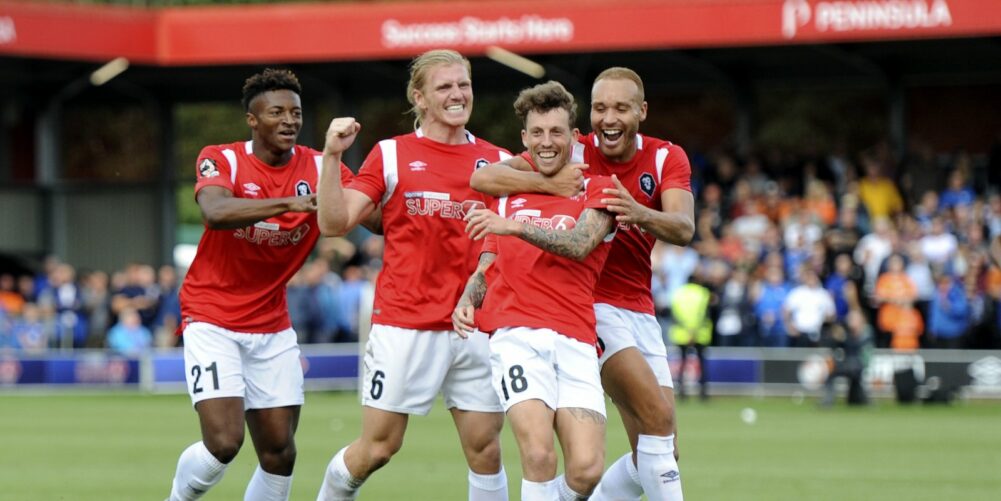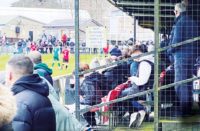By Matt Badcock
Chances are, you've already made your mind up about Salford City. After all, just who do the ‘Class of 92' think they are?
Taking over a nice little Non-League club, injecting the first team with cash to get up the ladder and boost their own ego. The scepticism is palpable.
Gary Neville, Paul Scholes, Ryan Giggs, Phil Neville and Nicky Butt are ruining this level of the game and the sooner they're out of it the better.
That's of course if they stick around for long. They'll probably get bored and leave the Ammies high and dry. At least, that's what people say.
But suppose you looked underneath the surface. Suppose you delved a little deeper into the story of why some of the most successful footballers ever to play in England, for the biggest club in this country, came to owning a football club.
How a conversation on a train journey home from London between Gary Neville and Giggs, was the acorn for a Christmas Eve meeting in 2013 with Salford chairman Karen Baird.
It has led to the transformation of a Step 4 club into one with designs of reaching the Football League. One with a new stadium, full-time employees, an academy, an education programme, a women's team, a foundation to engage with the community and, eventually, a club that will be affiliated with the Class of 92's groundbreaking university.
Salford City opened its doors to The NLP over two days for unrestricted access to learn about their vision – and how things are being done differently.
It's 8am on a Friday morning in September at Salford City's training ground. The first team players will be in early afternoon for a training session before they set off to play Bromley in the National League the following day.
Manager Graham Alexander and his staff are already working away in their large communal staff room.
Since 7am, the Neville brothers, Paul Scholes, Ryan Giggs and Nicky Butt have been sitting down with chairman Karen Baird for their monthly meeting.
On the agenda is how they can expand their match-day catering, what else they need to be improving, and, Neville's frustration at why, now they are at Step 1, are they not allowed to let fans drink beer while watching the game.
“Honestly, for the last three years our fans and the opposition fans have been able to come to Moor Lane – now the Peninsula Stadium – have a beer and watch the game,” Neville says. “I hate the fact that now those fans can't come and have a beer and watch the game.
“It's fundamentally wrong. There is a lack of trust towards football fans. We had a situation the other week where we were told to stop serving the away fans alcohol before the game. They weren't even misbehaving! To me it's wrong. There's a lack of trust and we have to change that. Football is far safer and far better than it was 30 years ago.”
Neville tells how recently, when he was away in London commentating on a Premier League game for Sky Sports, his wife and daughters went to watch Salford without him, preferring the surroundings of Peninsula Stadium to the grandiose Old Trafford.
The Class of 92's involvement began with a simple premise: their own academy. Neville can see where so many others have failed when they aren't linked to a first team and are instead little more than a glorified baby-sitting service. So they decided to invest in a club so there was a first team for young players to aim for. The next question was, who?
Scholes was born in Salford, Giggs lived there, Neville's first trial for United was at ‘The Cliff' training ground on Littleton Road when he was 11; they all trained there until their early 20s. The Ammies were the perfect fit.
It took a little more than six months to complete the takeover. Soon, Northern Premier League North matches were being watched from a grass bank – since replaced by a stadium fit for the Football League – by the famous five.
Each hold 10 per cent of the ownership, with the other 50 per cent owned by billionaire Peter Lim. Investment has led to three promotions in four years under previous managers Anthony Johnson and Bernard Morley, and last year they became a full-time set-up.
Quick-progress on the field has been a conscious business decision, so there is a Football League first team for the academy graduates to reach for. This year the spending has stepped up again as the club assembles a squad they hope will deliver promotion sooner rather than later. Reports of £4,000 a week wages – often inflated even higher by dissenters on social media – are overblown, but there is no attempt to deny they have a healthy pot.
Investment
The owners are aware the two-up scenario creates a bottle-neck they don't want to get stuck in so the money has been made available to, they hope, cost them less in the long run. Neville doesn't need telling it's upset many.
“You get a lot of, ‘Can't wait until you get out of this league, you're ruining it'. You get a lot of that,” he acknowledges. “Well, you say that but every time we go away from home it feels like there's a team that wants to beat us, a crowd that wants to beat us desperately and turn us over. To me that adds something. We're never going to get a favour, we're never going to ask for something – it's football!
“But we've invested our own money into this; we've invested our own time into this. We could have sat there at the end of our Manchester United careers very happily. Chatted a load on television, carried on earning money. Not invested anything into a football club; not invested anything back into football.
“The idea we're ruining Non-League, I find ridiculous. We've enjoyed it so much the last four years.
“That grass bank I used to stand on – I miss that bank. We used to stand on that in the first season.The most magical day we've had is still the Notts County night when we won in the FA Cup and we were all celebrating on that hill.
“I used to turn up at ten to three, pay to come in, stand on the bank, leave a couple of minutes before the end and go home. I never used to go in the committee rooms, directors' boxes. I always used to watch and go away.
“That's what I still do to this day but that bank is no longer there. That bank I miss but now it's fantastic, the crowds are brilliant and we've had to move on. We have to look at progression and we believe the development of the Peninsula Stadium is just that.”
But the charge is that it's not for the better and the spending has skewed the landscape.
“People will say, ‘Oh yeah, it's wrong, the money side of things', but we can go and spend our money on other things if we want,” Neville says. “We chose to put some of our money into this football club.
“I always refer to Jack Walker at Blackburn. He's seen as a gentleman, he's seen as a pioneer, a man with a great reputation. He invested into his local club. That's what we're doing.
“Jack Walker smashed transfer records left, right and centre – £4.5million for (Chris) Sutton, £3.5million for (Alan) Shearer. At the time it was off the scale. But people look at us differently, they think, ‘What are you up to? What are you doing? It's wrong.' I don't really know what to say to them. It's our club and we'll continue to invest in it.”
Sustainable
But what if they decide not to keep up that investing and, one day, up and walk?
“It's quite simple,” he says. “We made a couple of promises to the committee members. One was they'd continue to be part of the club. Then the structure and the way our companies are organised, if we walk away, we leave the club with the stadium. Debt free and the stadium. That's our promise.
“So if we walked away tomorrow, the original committee would get that stadium free. The money we've lost on the operational side – the playing investment and all the rest of it – is our loss. We've set it up in such a way that the club is protected and the ground will always go back to the members.
“We're not daft. We understand things can happen in life and in football. If we walked away in 15 years, which isn't our intention, if we walked away in four years or six months or 20 years or 30 years, that ground belongs to the members of the club.”
Baird remembers cancelling the first meeting about the takeover. It was the day after her work Christmas party and, for a Liverpool fan, meeting Neville and Giggs wasn't enough to soothe the hangover. “Maybe if it was Robbie Fowler,” she jokes.
But, on Christmas Eve, they did sit down at Giggs' restaurant. Baird had to go back and forth between the club's committee over the coming months as Neville, the driving force behind everything you see today, affirmed they needed all of the committee to remain.
As it was, she found herself at the helm having got involved when the former chairman asked Baird, who runs accountancy practices, to help them when they were three years behind with the books.
“I went and helped them with that and then they asked if I would be treasurer,” she says. “I sat through meetings thinking, ‘What the hell?'
“It was 15 older men, to put it politely, arguing over someone who had nicked some balls. I was thinking, ‘What am I doing?' But it hooks you in. I was doing that for six months and the chairman stepped down, everyone said, ‘You be chairman' and it went from there.
“I joke with Gary, ‘I used to have friends in football before I met you! People used to like us!' I feel like people on a one-to-one basis and teams we get to know, like us. When we went to the league awards, we're talking to them (other clubs) and it's like, ‘It's still us!' Whatever happens with the Class of 92, it's still us running it. We get so much stick but we're still running it.”
With the increased profile – the fly-on-the-wall documentaries have also helped – as well as the success, crowds have grown. Baird recalls hand-delivering 5,000 leaflets with friends when she first got involved.
“Free pint if you come to the game,” she says. “Not one came. Not one leaflet! It was soul destroying trying to get people through the gate. The difference is unbelievable.”
Neville is proud of their £10 entry and their cheap season tickets, saying they believe in “affordable football”. Fan zones have been set up at the ground to encourage that social atmosphere. He's also fiercely proud of the squad's make-up. With the big-name signings, it is easily overlooked 12 of the 22-man team are under 24.
Proud
“It would be great if in the next 18 months, two years, we can get an Academy lad into our first team,” Neville says. “They're only 17, 18 at this moment in time. But we're also proud of watching our first team now. Tom Walker, released by Bolton, went to Stockport, then FC United, we watched him last Christmas and thought, ‘Wow! This kid has got to come and play for us'. He looks fantastic.
“Ibou Touray went from Everton to Chester, Rhyl, Nantwich – he's now a National League left-back playing full time. So you don't just have to point to academy players we're taking up the ladder, we're taking players that have been released in the Pyramid and we're taking them back up with us.
“There's more doing the same thing, but those two stand out in particular. So it's not just about the academy, which is important, it's also about finding players who have fallen out of the system, and bringing them up with us and trusting them. We're not the only club who do that, but we do have a great faith in young players.”
Sporting director Chris Casper, who also began his career at Manchester United, oversees all aspects of football at the club, including recruitment. They background check rigorously. There was a case last season where they moved on from a target because of his social media postings.
All signings have to meet the standard. A thick document describes the profile of a Salford City player. They must be ready to impact the team immediately, young and emerging, or in the middle area where they can hit their prime over the next few years.
“You've got to start with an identity of what you're trying to achieve and what you want to be,” Casper says. “The players you are bringing in, are they the right character? Are they driven? Do they want to improve? Do they want to take us forward?”
Technically they have to be good enough and when they are watched in games, they will be closely observed as much for how they react in defeat as victory. Humility is required. The first team players clean their own areas at the training ground, a rota is pinned to the wall of the main room they share and socialise in – table tennis and darts help to build team spirit. Manager Alexander loves the down-to-earth approach.
“We've come from where we've been in the League and the cleaning is always done by scholars or actual cleaners,” Alexander says. “The players here, like Nathan Pond, muck in and if it's not done they have to do it the next day. Adam Rooney has come from the SPL, he's sweeping floors and mopping the corridors, which is fantastic.”
Alexander says the new arrivals have quickly settled into a club where the current players have helped set the tone for what's required.
“The players here before are used to the pressure of winning,” Alexander says. “Myself and the players who have come in have come from good clubs, but maybe not where everyone in this division is looking at you and wants to beat you. So that's been a new experience, myself included, and we had to come to terms with that pretty quickly.
“It comes down to players' character. Hopefully we get enough people in here, on the staff and experienced players, that have seen it, done it, know the pitfalls and will manage what is expected.”
Alexander arrived in the summer after a surprise sacking from Scunthorpe United last season. He didn't watch the documentary or, with his mind focused on his own job, look too much into what was happening, so arrived with his eyes open. He's been impressed with the standard and has quickly learnt how his side must be at their very best to get results. The message is clear, there's no ‘big time' here.
“It's a humble environment, a hard-working one and that probably suits Salford as a place,” Alexander says. “You go through Salford, you speak to the supporters, they are normal working-class people. It's important as a club, as a team, as players and individuals, you have to reflect what your club is.
“We represent the supporters and city of Salford. We're not prancing prima donnas above our station, we're honest, hard-working people who want to do well for our club. I don't think that's any different to the community. It's a culture that comes from the top, that is entrenched in the owners from their nurturing at Manchester United.
“People talk about culture,” Casper says. “It was probably the best learning, and experience through that culture you could ever wish for. I remember one game in my first year, it was before Christmas and I was in the B team. We were playing Marine A away, playing at this school. The pitch was on a massive slope, it was cold, it was raining. We had the physio, Jimmy Curran, the coach was Nobby Stiles and stood next to him was Bobby Charlton. Two World Cup and European Cup winners watching Manchester United B team on the worst day in the world. Stood there watching.
“Then at half-time being passionate, ‘You did this well, you need to do this'. I'll never forget that.
Confidence
“We used to do work experience over at Old Trafford when we were 16. The door to Sir Matt's room was always open. He'd always say hello or beckon you in, ask how things are going or how did you get on Saturday? The guy was an absolute legend of the club and he knew everyone's name. The manager was the same. It was just a feeling of being wanted.”
After playing, Casper moved into management at Bury and then worked for the Premier League to implement the Elite Player Performance Plan. But the financial rewards at that level means managers can't take gambles on young players, bar the exceptional. Play the kids and lose your job or go with the tried and tested.
But this generation of Manchester United players, famously, were given their chance. It's what they are trying to recreate at Salford with a second intake this season taking the number of young players split across two age groups (U17s and U18s) to 42 in Academy 92, which is linked with Trafford College. In games they are challenged and stretched with 16, 17 and 18-year-olds playing in an U21 development league as well as their college matches.
Casper calls it ‘extend and consolidate' like they did at United. A game in the reserves alongside Bryan Robson or Eric Cantona and playing a different type of match at Marine to one against another Premier League outfit like Liverpool at the Melwood training ground. At Salford, they want to encourage that growth. The club is based on ten pillars – tellingly, one is survival.
“We had one lad who went to a North West Counties side on loan last season,” Casper says. “I think his first game was South Liverpool away in front of 400 screaming Scousers. They didn't care he was a 16-year-old. He had to survive.
“One of our philosophies is survival. You've got to survive in tough environments. I don't mean we throw them in the middle of the jungle and say you've got to get on! We always support them, but it's extending them and making things tough for them. Put them into environments where they will struggle. How will they cope with that struggle? It's massively important for kids these days.
Competition is going out of PE at schools – here we've got league tables all over the place. First team, youth team, who's the quickest, who's the slowest? If you're the slowest, you've got a lot to make up. If you're the quickest, you've got to stay there.
“It's about being honest with players, it's saying, ‘That's where you are'. We want to create that competitive environment where a young player feels safe that he's going to get challenged in the right way, but spoken to in the right way too.”
While some academies focus on the football first and building of character second, Academy 92 flips that. The first focus is making players better as young men. A huge emphasis is put on both teamwork and leadership.
The players have a Plan A and a Plan B. Plan A is to be the best person they can be. Plan B is to be a professional footballer. It forms part of their Individual Development Programme (IDP).
Every 12 weeks the player identifies one of his strengths, one of his areas for improvement and takes ownership of the development. At the end of that period, they present back to the coaches often using PowerPoint and video. Presenting skills and communication are another pillar of the club.
Character
“One of the kids who came in at the start of last season, you couldn't look him in the eye,” Casper says. “Confidence-wise and self-esteem – he's been released by a club through no fault of his own. He could not look you in the eye. Six months later he was doing a presentation to the future 17-year-olds and their parents. Standing up doing a presentation! Kids should be able to present in front of other people, they should be coached and helped to do that.”
Nutrition is a big education for the youngsters too. Urine tests are conducted each day to check hydration. Fail two and they don't train. Each player has a booklet to guide when they should be eating depending on what time their game kicks off, which could be 11am as much as it could be 3pm or 5.30pm.
Regular yoga sessions are laid on, they all take a refereeing course as well as training and games alongside their academic education. Like the first team, the academy players have a cleaning rota at the training ground. Split into groups, a foreman is appointed and they are assigned an area – the U17s changing room, the U18s changing room and their own leisure space, an unused room converted into a break area where the players can microwave their own food and socialise. Phones are banned. If the cleaning is not up to scratch, the coaches will speak to the foreman for it to be redone.
“They are just good values,” Academy 92 boss Jamie Russell says. “We're bringing in that the lads will clean the boots of the first team. People could look at that and say, ‘Oh, that's not right'. But it's actually a great opportunity to buddy up.
“If I'm a right-back and you're the first team right-back and I'm cleaning your boots, that's not you standing over me and making sure I get every little bit of dirt off them and then get a cloth to go over the Nike tick or whatever brand it is.
“It's a great opportunity for me as a young player to talk to a first team player who plays in the same position as me, for you to give me feedback, and then if I do come up to train with the first team, I already know you. Straightaway that attachment is there. It's those things we've lost. Communication is a massive thing. How many people talk to each other nowadays?
Alexander regularly pulls academy players into first team sessions as familiarity builds. For each first team home game, academy players will sell programmes or be ball boys. Each week, 11 will conduct analysis of one of the starters who plays in their position, which will then be passed onto Alexander.
For Russell and his fellow academy coach Lewis Craig, the bar is being raised to develop footballers who can get in a first team that is rising through the leagues.
“A lot of people don't realise what a lot of good work is going on in the Non-League scene,” Russell, who has worked at Premier League set-ups, says. “Especially around academies and youth set-ups, with colleges and different things like that. There is a lot of really good work, a lot of people who dedicate a lot of hours and put in a lot.
“Wherever we go, people say, ‘Oh Salford, you've got loads of money – what's it like working with Gary Neville?' Well, we probably only see him a couple of times a year. We know he's massively involved, but directly he doesn't come down, doesn't say, ‘Here's a load of money'. We're working on the same shoestring budget as everyone else.
“When we try to book a pitch, they try to charge us more money. So we get a lot of interns and bring them in as members of staff. We can get psychologists, sports therapists, nutritionists – which adds another dimension to the academy. Because then we've got someone who is not only studying, but also knows other people in that domain and it can only make us better.”
‘Standard'. It's a word that comes up time and again across the two days. Neville accepts they are held to a higher one and he acknowledges they haven't always got it right. He uses catering as an example as they learn to cope with the bigger away followings. But this is a group of people who thrived on reaching the highest standards. Manchester United shaped them.
“It does,” Neville says. “We kick every ball, I get frustrated at every pass – I'm terrible in games – we want to be the very best we can be, knowing we're at a level. We want the standards to be as high as possible.
Targets
“The four years we've had have been magic. The dedication, the commitment of everyone has been incredible. The spirit that was created, the job Bernard and Anthony did for three-and-a-half-years was fantastic, it was perfect and everything the club wanted and needed.
“We're now entering into a new phase. We know it's going to go into transition, we know it's going to change. Graham is here with Chris Lucketti and we can see it. Our performance against Fylde (a 2-0 away win in September) was the best performance by a Salford team I've seen.
“Scholesy was there, and you're proud. That was a proper football performance. We passed it well, we created chances, we defended well, we looked organised, and we looked resilient. To keep a clean sheet against Fylde, a team that doesn't get beat at home, to play like that, to me it felt like a moment.
“I listened to Graham's interview after the game and he talked about how we've now got to keep reaching that standard. He's right. We shouldn't shy away from the fact we have to reach a high standard, and stay there.
“That's what we've been used to. We've been used to getting to a standard and maintaining it for 20 years. That's what we all have to do and at this football club, on and off the pitch, we have to maintain the standard.”
We are bringing Salford together
Foundation 92 – in the process of being set up as a charity – will be the club's vehicle to engage with the community and have a positive impact.
Andrew Gordon, an Ammies supporter, heads it up and knows the power the club can have on a city that has its issues.
Five areas – physical well-being, mental well-being, disability, youth offending and homelessness – have been identified to focus on, while players have already been making appearances at local schools.
“Salford has always had new things in it, but when it's been successful Manchester has swallowed it. Think about the Lowry and Media City – it's great investment in Salford as a city and it brings people, but people think it's Manchester.
“So to have something called Salford City, that can't have its identity stolen, is really putting Salford on the map. Because of that it gives you great reach to these people.
“I'm guessing most cities are the same, but you get quite insular. If people come from outside and tell you how you live, you're a bit apprehensive.
“But if you've got something run by the people of the city for the people of the city, they're more open to it. So if we go into the schools and say, ‘Do you know what, you can make these lifestyle changes for your benefit,' I think they will be happier to listen to it. We've got a great opportunity, but also a great responsibility.”
Gordon, who says supporting Salford has helped his own anxiety issues, believes clubs don't always realise the difference they are making.
“My mum's a vicar and in the past a lot of people would turn to the church as the centre of the community, where people come together and look for support,” he says.
“That still exists but the way football is now, there's a real responsibility to give that support to people coming through the doors week in, week out.
“I don't think people realise the difference of just standing next to ten people on a terrace and the sense of belonging that gives you.”
Building a future for all involved
As well as in sport, the Class of 92 see they can make a difference in education, which in turn will help the north, wider country and even the world with overseas students.
Partnered with Lancaster University, UCAS applications open in January for people who want to study sports science, physical education, psychology, business or media.
With links to companies like Microsoft and KPMG, ‘UA92' aims to provide a different way of delivering education at degree level.
Again, there is a big emphasis placed on the building of character to meet the real-world business need, as Yvonne Harrison, who is in charge of the whole Project 92, explained.
“Gary was often faced with people in businesses who complained about young people, saying they don't make them how they used to; they don't have the drive or the work ethic to know that you have to be in from 9-5 in some instances,” she says. “He didn't think that was right, especially as more people than ever are going to university, paying all this money, making that investment and then to come out of it and you still can't get a job.
“He wanted to know what he could do about that. That led to conversations, both at government level in terms of higher education reform and identifying a university partner that could work alongside us to shape this idea.
“We want to be the disrupter in higher education; we want to say that there is a better way to deliver more value to young people.”
The football club will also benefit. It's hoped it will bring in new fans, internships will be offered to some students at the football club and academy players could be directed to the higher education route.
“We have lads playing in the academy now who will progress. Others might not make it, but could have a career in football as there are different opportunities. We can carry on and build their education here and potentially go down a degree pathway, which will instil the principles they have learnt and they can build upon them.”
Ammies have girl power
This season has seen the launch of Salford City Lionesses, a women's team who will compete in Greater Manchester Women's Football League Division One.
“It's not just giving the lads an opportunity, but giving local women an opportunity to be part of the club,” sporting director Chris Casper says. “Having that overall community spirit and feeling of togetherness.
“We do need to become a family club, giving people from the local area an opportunity.
“We've got a responsibility for the physical well-being of people as well. If they want to come along and join in a training session, use it as a way of keeping fit and being part of a social group, then we'll support that.
“The girls game is expanding all the time, obviously one of our owners is the England manager as well – it's not just about Salford City's first team spending money on Adam Rooney or Rory Gaffney to get through the leagues as quickly as possible. We want to build a club as well.”





























